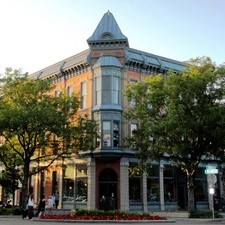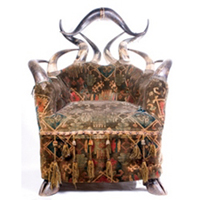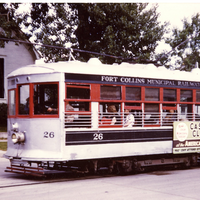News Flashbacks
In Fort Collins 67 Years Ago
Fort Collins Express 6/12/1933 p. 2

George McCormick at Thermopolis Wyo. has sent a page from the Wyoming State Journal of Lander, Wyo., to The Express Courier, which contains an account of Alice Wroe's life, including settlement on or near the present site of Fort Collins by her father, Lorenzo Davis. The following is an extract from a most interesting autobiography by Mrs. Wroe:
I was born in Jefferson county Illinois on Jan. 1, 1856, 6 miles from Mount Vernon Ill., daughter of Mr. and Mrs. Lorenzo Davis.
Because of bad eyes I could not attend school but was confined to the house in a dark room with a sunbonnet on my head for most of the time. I had no happy childhood life.
When I was 7 years old my father went West to Idaho in the gold excitement of 1863. While he was working in the gold mines he would go 25 miles on snowshoes, buy a 50 pound sack of flour for $25 and carry it on his shoulders as he rode the snowshoes.
He was gone three years and in the meantime took up 160 acres of land as a homestead in the center of what is now Fort Collins, Colo.
He drove a team and covered wagon back to Kansas City, where he left the team and went by boat to St. Joseph, Mo. My mother and three daughters met him there as had been previously arranged, and went back to Kansas City by boat from St. Joseph. In company of three other covered wagons we drove to Fort Collins. We were fortunate in not getting into any Indian trouble, but each twenty five miles of the way there was a strong stockade where we drove the teams and wagons in a block house (called Pilgrim Houses) where the families stayed all night. These houses were so arranged with port holes in the sides to poke the guns through in case we needed to shoot at the Indians.
We were seven weeks on the way in our wagons traveling every day except Sundays and reached Fort Collins in December. There my father had a good sized log house ready for us. Our beds were made by boring holes in the wall of the house and putting in poles the right length for beds, then holes bored in these sides and ends of the beds and ropes woven back and forth to form springs. There was no floor except the ground. Our chairs were sawed off the right height, our table was made of dry goods boxes, and aside from our stove, this was our furniture.
While in Kansas City a little boy gave me a Newfoundland dog and a harness he made for him. The dog pulled a little wagon with the little boy in it all over the small city of Kansas City. I could not take the wagon but brought the dog all the way. One place we stopped a man offered $25 for the dog and was refused.
Next night when we camped the dog was missing and we thought the dog was with some of the other wagons. My father got one of the horses and rode a day's journey, 25 miles and on being told the dog was not there, had not been seen, loudly called him. He came bounding through a window from where he was shut up. When we got to Fort Collins, father made me a little wagon with wheels made from the ends of logs and I rode in this and drove my dog Carlo.
There was a road house 1 mile away, and a fort called Laporte where there was a post office, 2 miles from our place, in the trees near the Cache la Poudre river and over the path where we went down to get water was an Indian burying ground. There we could see many, two dozen anyway, dead Indians wrapped in Buffalo robes and tied with rawhide and strapped to the trees. Needless to say we girls carried the water before dark! There were no schools, churches, or Sunday schools anywhere. In 1867 father put in his crops and in July the grasshoppers came. They came like a heavy black cloud and settled on the ground like a heavy blanket and in a few days there was not a green thing left. Our cabin had a dirt roof and in the spring there came three day's rain. The house leaked so badly that father put up a tent inside the house where we stayed during the rain.
After the grasshopper experience, we again loaded up our possessions into the wagon and started for Cheyenne.


Preserving the history of Fort Collins, Colorado & the Cache la Poudre region





